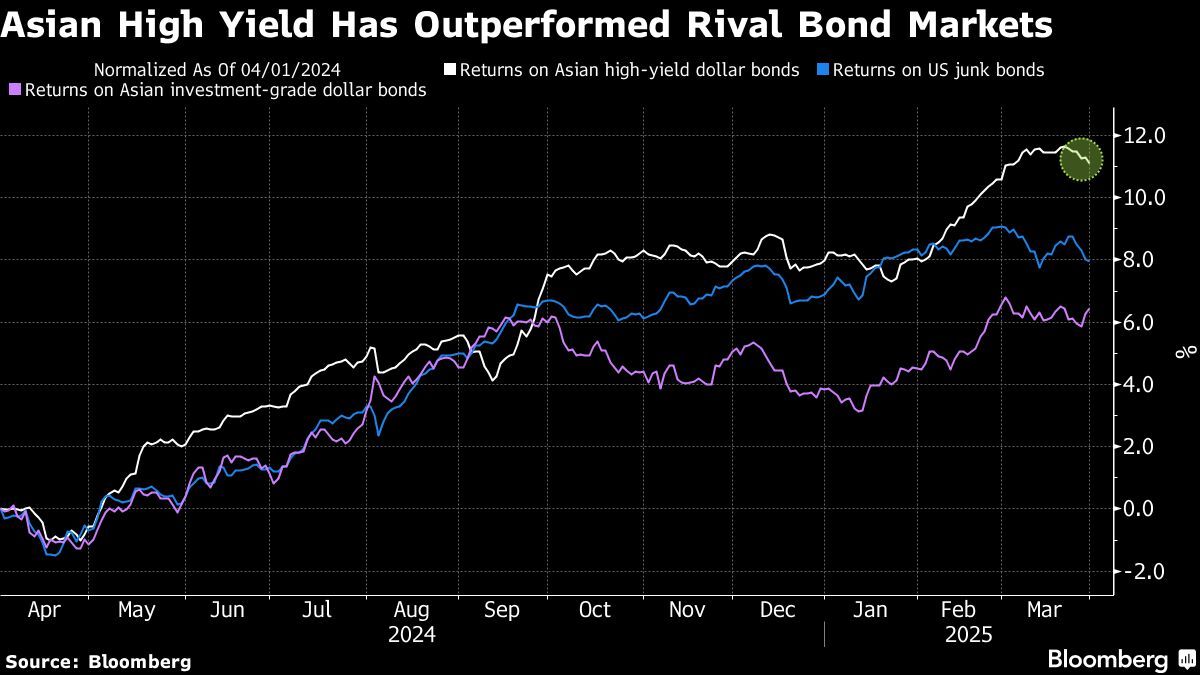
(April 2): An Asian junk bond investor who beat 98% of his rivals last year said he is “very bullish” on the market — and ready to pick up bargains if other investors panic.
Raymond Gui, head of Asia fixed income portfolio management at UBS Asset Management Ltd, said the region’s high-yield bond issuers are largely insulated from the tariff fears rattling global markets. But he still expects rising levies to weigh on sentiment, creating the chance for profitable trades as investors dump risk.
“Tariffs will have more of a sentiment impact on the Asian high-yield market rather than a direct impact on credit fundamentals,” he said. “Our analysis shows very few Asian high-yield issuers have direct export business to the US. So if it does cause an overshoot in certain high beta high-yield credits, to us it’s a buying opportunity.”
That may appear a surprising approach at a time when global investors are fleeing risk in the run-up to the next announcement of US tariffs on April 2. Stocks have whipsawed this week as investors brace themselves for the levies while gold — a popular safe haven during times of turmoil — has hit an all-time high.
But Gui is not alone in seeing the high-yield market as a bright spot: Some US investors have recently turned to junk bonds to weather the storm, and riskier assets have proved to be surprising safe-havens during previous bursts of volatility this year.
Default cycle wanes
Gui manages UBS’ Asian high-yield dollar bond fund, which returned around 16% last year, compared to an average 9% return for other high-yield funds, according to data compiled by Bloomberg.
His optimism is based in part on a belief that a wave of defaults — largely driven by Chinese real estate firms — is coming to an end. China property now accounts for only about 7% of the Asian high-yield market, down from 38% in early 2020, he said.
“From our bottom-up study, there are very few default candidates for Asia in 2025,” said Gui. “The low default rate will be a strong driver to push for further spread tightening.”
He also said relative valuations in the market have still not recovered to the levels they were at before Covid-19, suggesting further room for tightening. Asian junk bonds offer a 163 basis point yield pick-up over a global basket of high-yield debt, compared with an average of 45 basis points in the decade preceding the pandemic in 2020, data compiled by Bloomberg shows.
Junk bonds in Asia have outperformed obvious alternatives this year, according to data compiled by Bloomberg. They returned 2.8% this year, compared with 1.2% for US high-yield and 2.7% for Asian investment-grade notes.
The domestic focus of many high-yield companies offers reassurance for investors during a period of global uncertainty, said Henry Loh, head of Asia credit at Aberdeen. But investors still need to be “nimble” in their approach, he said, pointing to the myriad sources of volatility in the market.
“With tighter spreads generally, the margin for safety is low and sentiment can reverse dramatically and very quickly,” said Loh.
Uploaded by Magessan Varatharaja
- Trump says talks on Russia-Ukraine war talks might be going OK
- South Korea ex-president Yoon to face trial over martial law: Yonhap
- Iran, US hold 'positive' talks in Oman, agree to resume next week
- Central banks prepare first G-7 responses to US chaos
- Apple, Nvidia score relief from US tariffs with exemptions

